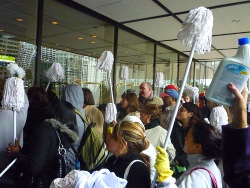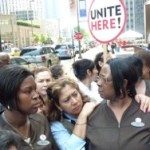Women supporting Hyatt housekeepers send delegation to hotel to help workers clean rooms
Responding to injury reports, community says, “If Hyatt won’t ease their housekeepers’ burden, we will”
 Responding to reports of work-related injuries in Hyatt’s housekeeping departments, a group of 50 women from across the city of Chicago rolled up their sleeves to go into the Hyatt Regency Chicago and help the housekeepers clean their rooms.
Responding to reports of work-related injuries in Hyatt’s housekeeping departments, a group of 50 women from across the city of Chicago rolled up their sleeves to go into the Hyatt Regency Chicago and help the housekeepers clean their rooms.
The delegation, led by professors, housekeepers and Lynda DeLaForgue, the Co-Chair of Citizen Action, comes just one week after housekeepers at the Hyatt Regency and several other Hyatt properties in Chicago filed complaints with OSHA about work-related injuries that can lead, in some instances, to permanent disability. The delegation was met at the door by Hyatt management and security, who rejected the offer by the community to help the workers. Teems of housekeepers and other hotel workers peered through the windows waving to supporters outside carrying mops and fitted sheets, who chanted “we want to help” until they were ushered away by police.
“Housekeeping is hard work, and many ladies are having accidents, slipping on wet floors or hurting their hands and wrists lifting heavy mattresses,” says Ofelia Martinez, who works in housekeeping at the Park Hyatt. “My message to Hyatt today is stop pushing us to work so hard, especially non-union Hyatt housekeepers who are cleaning 25-30 rooms a day. We are not animals, we are humans.”
A major peer-reviewed study of hotel worker injuries at 50 U.S. hotels operated by the five largest U.S. hotel companies was published in the American Journal of Industrial Medicine (AJIM) earlier this year. By company, housekeepers working at Hyatt hotels in the AJIM study had the highest injury rate of those hotels studied.
Injuries in the hotel industry disproportionately affect women. Nearly all housekeepers are women, and a research study involving the five largest hotel companies in the U.S. shows housekeepers to have the highest injury rates.
The women leading the delegation into the hotel are bringing with them supplies for the housekeepers that reduce some of the strain associated with housekeeping work. Supplies include common sense solutions to the problems associated with housekeeping work, such as fitted sheets to reduce the number of times that women must lift mattresses weighing nearly 100 lbs. to tuck sheets, and long-handled mops, so workers do not have to get down on their hands and knees to clean the floors.
“We come today with mops, rubber gloves, and our compassion,” says Virginia Parks, an Associate Professor at the School of Social Service Administration at the University of Chicago. “We’re here to say to the Hyatt housekeepers, you are not alone in your struggle.”
In May 2010, over one hundred housekeepers at the Hyatt Regency Chicago stopped work for several hours, protesting worsening working conditions in housekeeping.

